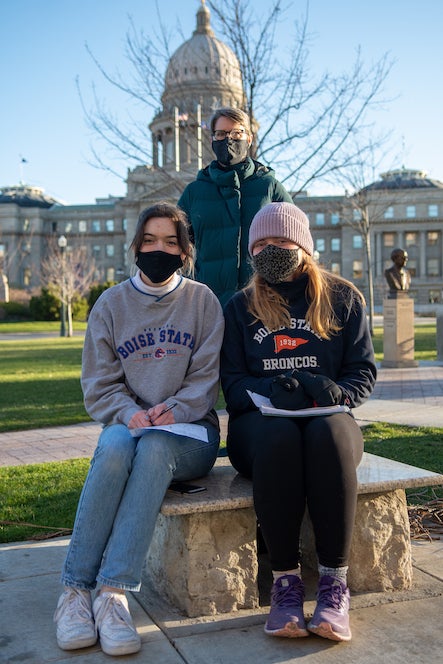
In the spring of 2021, Krista Paulsen, an associate professor in the School of Public Service, partnered with the Treasure Valley Cycling Alliance (TVCA) to provide students with a unique service-learning experience that also addressed sustainable transportation, one of the community’s most pressing issues.
Students in her class (URBAN 410 Sustainable Cities) conducted street-level research that will help inform TVCA policies.
As part of their class work, students studied how other cities are measuring the demand for bike infrastructure. They then generated research questions, such as how cycling varies across higher- and lower-income neighborhoods, and how K-12 students use cycling infrastructure to get to school.
In March, students hit the streets to count bikes in the community, analyze their data, and write a report for TVCA.
Their research confirmed the importance of considering cyclists in designing detours for construction projects. It found that infrastructure like bike lanes and neighborhood “bike culture” both influence the number of junior high students who ride their bikes to school. Students also documented more helmet use where cyclists share roadways with cars than where they have bike lanes or separate paths.
“We appreciate the URBAN 410 students who helped identify barriers and opportunities to cyclists in Boise through their bike counts around the city,” said Mike Stefancic, TVCA vice president. “Their inquiries gave us new ways to see cycling in Boise that will expand the work we can do in the city for years to come.”
A community benefit
In designing the course, Paulsen consulted with Boise State’s Service-Learning program about best practices and community partnerships.
“Service-Learning is a high-impact teaching practice that helps students apply course concepts in the real-world setting. Students experience first-hand how their academic discipline – and they themselves – can help address important issues in our community,” said Kara Brascia, director of the program.
Paulsen said she’s continually impressed by the enthusiasm and commitment that students bring to service-learning projects. “They embrace the opportunity to use their knowledge in useful ways, and they show amazing leadership and problem-solving skills as they take on this work,” she said.
Senior Katelyn Davison, an urban studies and community development major, said she enjoyed working on this research in a city known for biking, as well as partnering with TVCA and its mission to make biking safer and more accessible.
“When working on projects in a classroom setting, it can be difficult to connect to your research or feel invested in the topic you’re studying, but being able to collect data firsthand helped me realize that the work we were doing actually mattered,” Davison said.
The partnership with TVCA is the second service-learning project Paulsen has designed for students. An earlier project focused on affordable housing.
More about Service-Learning
Each year more than 3,000 students participate in over 170 service-learning classes at Boise State. In the last academic year, 44% of all graduating seniors had taken a service-learning class. Contact KaraBrascia@boisestate.edu or visit boisestate.edu/servicelearning for more information.